
Infectious disease experts had predicted it wasn’t going to be a fun virus season. From unwelcomed strains of strep and COVID to influenza A and RSV, symptoms range from head-to-toe, with plenty of viral cases centering on tummy issues. We hope you don’t need any of these foods for an upset stomach, but if you do, we’ve got you.
The Healthy @Reader’s Digest spoke with Dallas-based registered dietitian Amy Goodson, MS, RD, CSSD, LD, as well as New York City-based dietitian Lisa R. Young PhD, RDN, CDN, an adjunct professor at New York University and author of Finally Full, Finally Thin. These two nutrition specialists revealed which foods are best for soothing an upset stomach…as well as a few foods to avoid when you’re feeling a little queasy and uneasy.
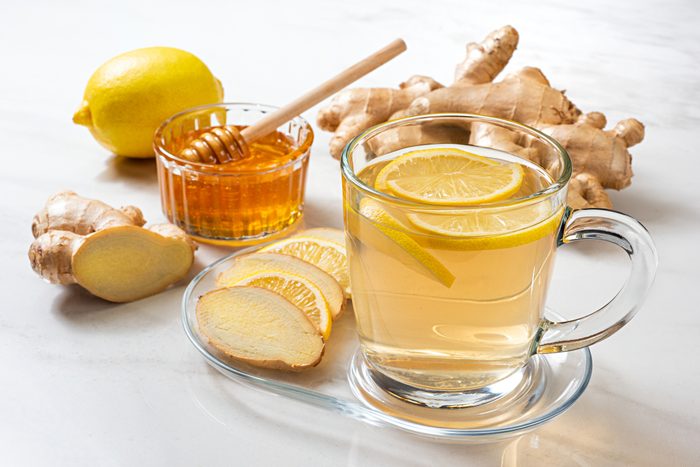
Ginger tea
There’s a reason your mom gave you ginger ale when you weren’t feeling well. Ginger has a particular nausea-reducing effect on the body, and is known for being especially helpful for women experiencing pregnancy morning sickness.
Goodson explains: “While the exact mechanism of how ginger works is unknown, it is thought that ginger regulates nervous system signaling in the stomach and speeds up the rate at which the stomach empties, thereby reducing nausea and vomiting. Ginger tea might be one of the best ways to consume ginger, since it’s important to stay hydrated when you feel bad.”
Here’s How Much Water You Really Need in a Day, with Nutritional Scientists’ Latest Wisdom
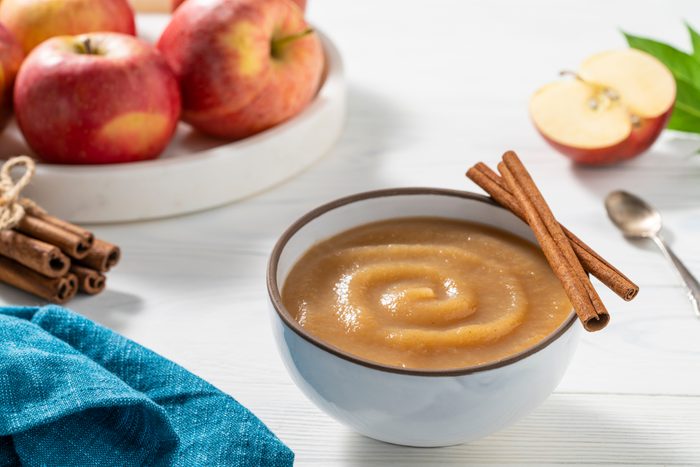
Applesauce
If your stomach problem isn’t so much about nausea and more about dealing with, well, number two, then applesauce may be a helpful treat.
“Applesauce is easy to digest and full of nutrients including pectin, a fiber that dissolves in water. It can help add bulk to your stool to help you get rid of diarrhea,” says Goodson.
While pectin is commonly used as a thickener in cooking—like for baking and thickening homemade jam—it is also soluble fiber that is naturally found in fruits, which helps with normal bowel movements. Research shows that pectin works as a prebiotic in the body, balancing the microflora (bacteria) in the gut while reducing inflammation.
“Applesauce is also shelf-stable, meaning you can have it in your pantry for when you might need it. Look for no-added-sugar applesauce when you are out shopping,” she says.
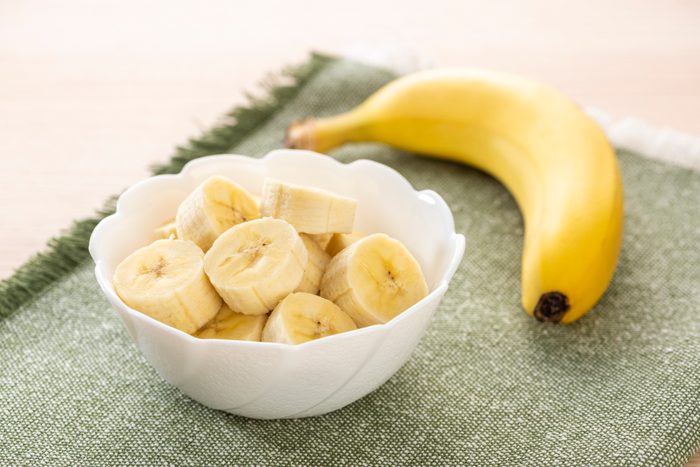
Bananas
According to the National Institute of Diabetes and Digestive and Kidney Diseases, if the body is losing a lot of fluids it needs to be rehydrated. Electrolytes, including sodium, calcium, and potassium, are essential minerals the body needs for hydration (which keep so much functioning properly, from bowel movements to brain health). And what fruit is known for being high in potassium?
“Bananas are easy to digest and contain the electrolyte potassium that is lost if you have been vomiting or having diarrhea,” says Goodson. “Bananas also provide you with carbohydrates to help with energy levels.”
The 3 Best Hydrating Beverages That Aren’t Water, from a Certified Sports Dietitian
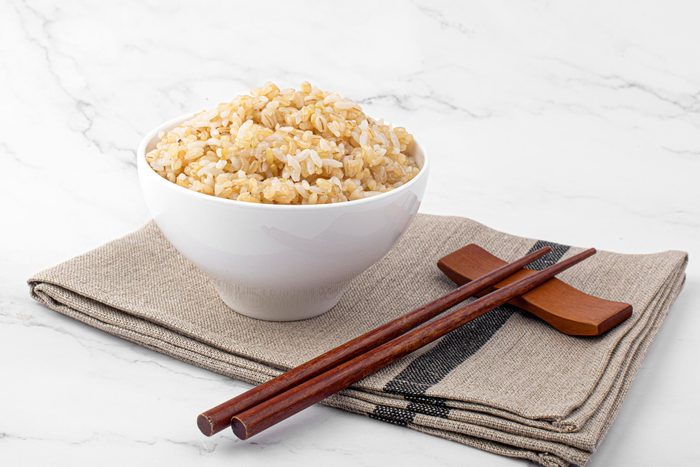
Bland carbohydrates
“Bland carbohydrates like toast, rice, and crackers may be helpful in that they are easy to digest and can help stabilize blood sugar,” says Goodson. Saltine crackers are commonly recommended for an upset stomach, especially given how they can replenish the body with electrolytes.
These types of carbohydrates are part of what dietitians call the BRAT diet, which stands for bananas, rice, applesauce, and toast. Young says these foods are typically recommended because they are bland and gentle on the stomach—especially for someone who’s experiencing diarrhea.
Goodson also points out that while healthy eating specialists typically recommend eating high-fiber whole grains, these aren’t the types of foods you want to consume if your gastrointestinal system is off. “You actually want to consume lower fiber, easy-to-digest foods,” she says, adding that a “small amount of fiber … can help to firm up stools without causing further gastrointestinal distress.”
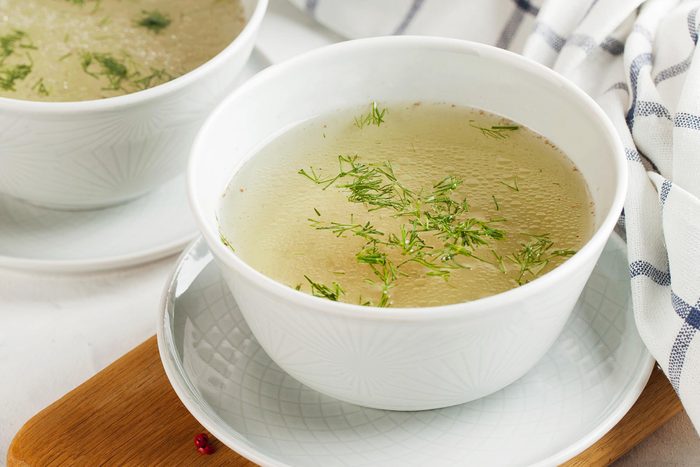
Broth
Yes, that bowl of chicken noodle soup really does benefit your body when you’re sick—besides the comforting nostalgia factor, of course. The broth in that soup is actually beneficial for hydrating the body with fluids.
Young says getting enough fluid into your system is important, especially if you’ve been experiencing diarrhea or vomiting. “You need to replenish the fluids. Clear broths like chicken soups or bone broths are great options,” she says.
The American College of Gastroenterology backs this up, saying that soups and broths can help with replenishing the body and keeping it hydrated thanks to the extra salt and sugar. However, milk-based soups should be avoided because they could make your diarrhea worse.
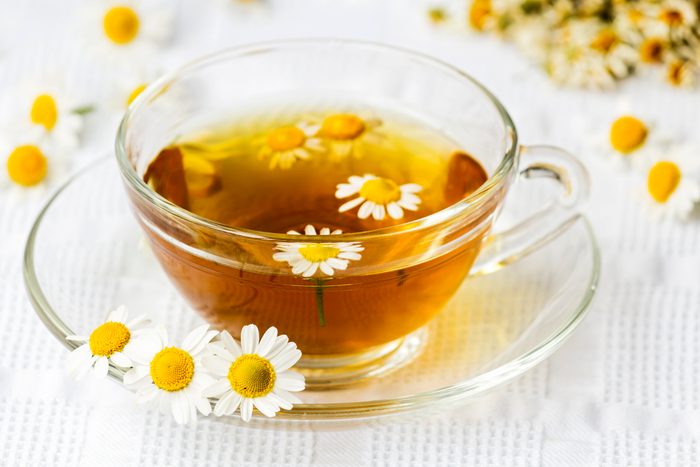
Chamomile tea
Another fluid known for soothing is chamomile tea, according to Goodson. “It’s known to help with intestinal troubles like gas, indigestion, diarrhea, nausea, and vomiting.”
However, Goodson cautions that while chamomile is widely recognized for having gut-soothing effects, there isn’t much research yet to back the claim. But one 2010 review in Molecular Medicine Reports does point to promising early research regarding chamomile tea’s effects on soothing stomach pains and nausea, while also benefiting those dealing with diarrhea, when the tea was mixed with apple pectin.
Either way, chamomile tea can be soothing and inarguably increases fluid intake, both of which can help if you’re experiencing nausea or certain stomach discomforts.

Probiotic-rich foods
If your stomach problems are more to do with digestive trouble, Young says getting enough probiotic-rich foods is key for keeping the digestive system healthy and happy. “These are especially good if you recently took antibiotics. Examples include miso, tempeh, and yogurt,” she says.
On the other hand, while probiotic-rich foods aren’t as recommended for someone who’s suffering from nausea or the stomach flu, Young says once the sickness passes, it would be wise to replenish the gut with the healthy bacteria that come from these types of foods. A 2012 microbiology study at the University of Michigan Medical School suggested that following norovirus infection (which causes vomiting and diarrhea and can disrupt the microflora in the gut), replenishing the bacterial balance in the belly can help reinstate wellness and fend off further illness.
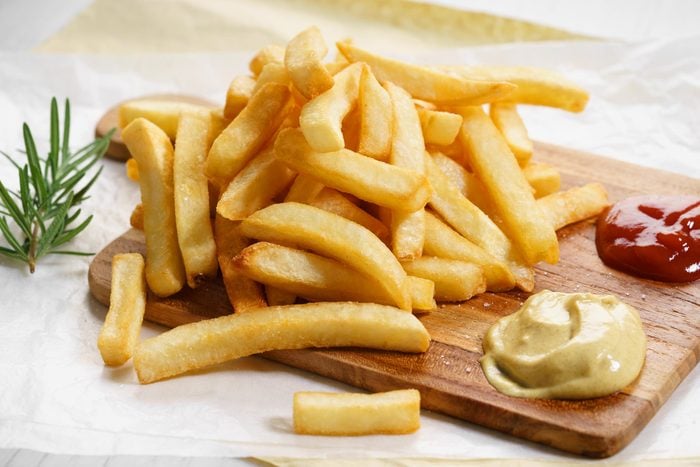
Foods to avoid
If you’re dealing with bouts of nausea or an upset digestive tract, both dietitians say it is best to steer clear of these foods until your system is brought back to normal.
High-fiber foods
“While fiber is typically great for you, it can further gastrointestinal issues if you are sick,” says Goodson. “Stay away from cruciferous vegetables and high-fiber grains and give your gut time to settle and heal.”
The Best Foods That Help With Constipation
Fried and high-fat foods
People with an upset stomach may want to avoid high-fat foods including fried foods,” says Young. “They are hard to digest and may worsen an upset stomach. Examples include French fries, fried dishes, high-fat meats, and high-fat cheese like brie and cream cheese.”
Eating These Foods Can Lead to Premature Death, Says New Study
Spicy foods
“While not for all people, for many, spicy foods can contribute to indigestion and heartburn,” says Goodson. “If you aren’t feeling well, leave the spice alone and aim to eat more bland foods.”

